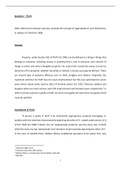Question – Theft
With reference to relevant case law, evaluate the concept of ‘appropriation’ and ‘dishonesty’
in relation to Theft Act 1968.
Answer:
Property, under Section 4(1) of Theft Act 1968, can be defined as a thing or things that
belongs to someone, including money or anything that is real or personal, also consists of
things in action and other intangible property. 1 An action that caused the owner to lose his
dominion of his property, whether forcefully or silently, is known as property offence. There
are several type of property offences such as theft, burglary and robbery. Originally, the
maximum sentence for theft was ten years imprisonment but this was substituted to seven
years which stated under Section 26(1) of Criminal Justice Act 1991,2 whereas robbery and
burglary which are more serious, were life imprisonment and fourteen years respectively. 3 In
order to prove a person is guilty in theft, its actus reus (guilty act) and mens rea (guilty mind)
must be satisfied.
Ingredients of Theft
‘A person is guilty if theft if he dishonestly appropriates property belongings to
another with the intention of permanently depriving the other of it’, stated under section 1(1)
of the Theft Act 1968.4 Clearly, the act ‘appropriates property’ was the actus reus of theft
while the mens rea was ‘dishonestly’ and ‘intention of permanently depriving the other of it’.
In this case, to identify them, William Wilson established questions to be asked. First, was
1
Theft Act 1968 s 4(1)
2
Criminal Justice Act 1991 s26 (1)
3
William Wilson, Criminal Law Fourth Edition, 402-403.
4
ibid 403.
1
, there an appropriation?5 Second, was a property appropriated?6 And third, was the property
belongs to another while it was appropriated? 7 If the three questions stated above was ‘yes’,
actus reus is proven. To satisfy mens rea, what should be known are, whether the
appropriation of the other’s property was dishonest.8 And secondly, whether there was an
intention to permanently deprive the owner of the property when the appropriation was
done.9 Despite this, there is still some grey area when applying them in the law and they are
significant in the developing of law.
Appropriation
Under Theft Act 1968 s3 (1), an appropriation is any assumption by a person of a rights
of an owner, including using it as an owner without stealing it no matter innocently or guilty.10
This is not limited to only real property, also involving money and intangible property such as
debs and company shares and the word ‘stealing’ is no longer be restricted in tradition
understandings, but further than that.11 To elaborate this, the term ‘steal’ was defined in the
past as taking or using other’s property without gaining permission of the owner. However,
even though a person take or use property after gaining the permission from the owner, in
terms of law, appropriation shall take place. This can be verified in the case Lawrence v MPC.
Lawrence v MPC [1972] AC 262
An Italian student, who can speak a little English, arrived at London Victoria Railway
Station. He was then got into a taxicab which the defendant was the driver. Defendant told
him that it will be a long journey and the price might be higher than usual and he agreed.
After arriving at destination, he paid £1 to the defendant which is more than sufficient but
the defendant said it was not enough and take another £5 from his opening wallet. However,
the actual fees for the journey was only 10s 6d. The defendant argued that he took the money
under the consent of the owner so there was no appropriation occurs but this was not agreed
by Viscount Dilhorne.12 He stated that under s1 (1) of Theft Act 1968, there was no phrase
5
ibid 403.
6
ibid 403.
7
ibid 403.
8
ibid 403.
9
ibid 403.
10
Theft Act 1968 s1(1)
11
ibid 404.
12
Lawrence v MPC [1972] AC 262
2




